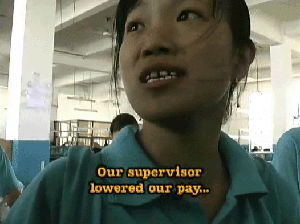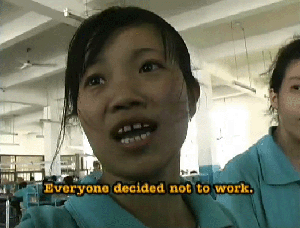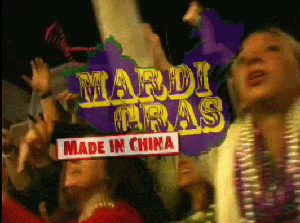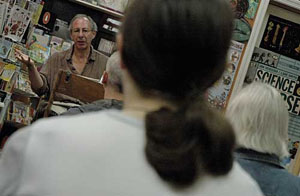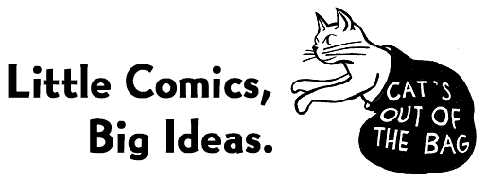Thanks to Michael Moore, the growth of a moderately-aroused left-liberal public since the invasion of Iraq, and the low manufacturing costs of DVDs, the politically-conscious documentary film has reemerged in the United States. A central figure in this movement has been the seasoned producer-director Robert Greenwald. Formerly known for TV epics like Flatbed Annie and Sweetiepie: Lady Truckers and as director of the Olivia Newton-John bomb Xanadu (the ignominious end to Gene Kelly’s career), Greenwald has atoned for his commercial sins with the Fox News exposé Outfoxed and a trilogy of films on the Bush coup and its aftermath, producing Unprecedented: The 2000 Presidential Election and Unconstitutional: The War on Our Civil Liberties, and both producing and directing Uncovered: The War on Iraq.
With Wal-Mart: The High Cost of Low Price, Greenwald — again as producer and director — has taken on an American institution, the cut-price mega-retailer whose gross sales exceeds the GNP of many countries. Heaven knows, Wal-Mart has done enough to deserve the public pillory, and it outshines many other giant corporations in the sheer variety of its misdeeds. Its employees are underpaid and need to depend on welfare programs shockingly often, its environmental practices are careless at best, its role in the devastation of what remains of independent retailing unquestionable, and its complicity in sweatshop factories in China and throughout the global South undeniable. Given such a target, Greenwald could hardly miss, and much of the film is worth seeing. We hear from a number of former Wal-Mart managers whose damning testimony is rendered more believable by their evident sense of betrayal by the corporation they had once identified with. One of them takes the filmmakers to the fenced-off, blastproof bunker the Walton family built after 9/11. A world where Sam Walton’s children play Adam and Eve — that’s the stuff of horror movies.
Unfortunately, the film is reduced to the sum of these accounts. As a whole, Wal-Mart is far less focused and insightful than it could have been. It shares the too-familiar documentary rhythm of talking heads witnessing to the subject’s acts alternating with intertitles and ironic found footage, here from Wal-Mart commercials and stockholders’ meetings. Predictability, though, is only one of the film’s problems. Quotations are unsourced, a confusing variety of speakers contribute voice-overs, and Greenwald tosses in an amateurish parody commercial which adds nothing to the film beyond a further blurring of narrative focus. An obtrusive score turn honest sentiment into sentimentality. The story of a Missouri family forced to close their three IGA stores after Wal-Marts opened in the region — with tax breaks from local governments — is sad enough to stand on its own. It is only cheapened by the harmonica playing “America the Beautiful” in the background.
Nor has all the material been thought through adequately. There is an effective sequence on a small organizing drive in one department of a Colorado store, but nothing on the Quebec store that Wal-Mart closed when it was unionized. A number of public school teachers speak about what schools could have done with the tax-abatement money granted to local Wal-Marts, but this is a red herring. Municipal governments see such incentives as investments rather than giveaways. A new Wal-Mart is supposed to expand the local tax base, create jobs both in construction and store staffing, and attract business and therefore additional sales tax revenue from outlying communities. The company argues that the benefits to host communities will easily exceed the cost of the incentives, so that in the long run there will be more money for schools and municipal services, not less. (It also threatens to build just outside the municipality if its demands are not met.) Although this argument can be shown to be false, there’s very little in the film that suggests that Greenwald is aware of the need to address and refute it.
| Click on any of the images below to watch the trailer of Mardi Gras: Made in China. |
The film’s sequence about Wal-Mart’s China connection is similarly flawed. Greenwald does not have the astounding in-factory shots or conversations of the excellent Mardi Gras: Made in China. He is forced to make do with exteriors, dormitory footage, and a handful of interviews with Chinese workers. (The films disconcertingly names them “Princess” and “Little Bear;” though presumably English translations of parts of their names, using these instead of the workers’ briefly-visible real names presents them as not-quite-adult.)
Even these interviews, though, are mishandled. Workers talk a good deal about the instructions they are given before Wal-Mart inspectors visit, telling us how they are taught to lie about hours and conditions to the American personnel. Greenwald thus inadvertently establishes that the Chinese management is afraid of the inspectors, making it seem as if Wal-Mart were genuinely concerned about working conditions at its suppliers’ plants. We find out later that this is not the case, when a former inspector once assigned to suppliers in Mexico and Central America describes his horror at discovering that his supervisors did not want him to report on the abuses that he found. On his account, lying to the inspectors is unnecessary, since they are going to report compliance no matter what they hear or observe. Much of the China sequence is thus irrelevant and misleading.
What finally cripples Wal-Mart: The High Cost of Low Price, though, is its failure to see or understand the economic system in which Wal-Mart thrives. Greenwald and some of his speakers ask why a company as profitable as Wal-Mart doesn’t pay employees a living wage and doesn’t offer affordable health insurance. But why should it? Because it’s shamed by talk from liberal film makers? Because the Walton family has a collective bad conscience?
Like any other successful corporation, Wal-Mart does whatever it can to build profits. Paying the lowest wages that the market will bear isn’t a sin specific to Wal-Mart; it’s what every business is expected to do, regardless of its commitment to the community or the bosses’ affection for the workers. The nice guys who run family-run firms are fighting the logic of the system. No matter how level the capitalist playing field, sooner or later they’re going to be facing someone more ruthless. Minimum wage legislation, environmental protection laws, industrial safety codes, and the rest of the now-threatened social state face the same unending battle against forces that grow inexorably stronger until their contradictions weaken them or the majority revolts.
Nor does Greenwald appreciate the reasons for Wal-Mart’s peculiar power. In a time when few people under forty can remember an industrial economy, giant retailers like Wal-Mart are among the few new employers that communities can hope to attract. In this respect (and perhaps in others, too), they’re like prisons. And the managers of other firms, themselves under unrelenting competitive pressure to cut costs, are hardly going to complain about a store big and mean enough to depress prevailing wage rates and ruthless and efficient enough to keep the cost of necessaries low. Wal-Mart makes their job easier.
However egregious its conduct, in the world of twenty-first century capitalism, Wal-Mart is the rule rather than the exception. If you want to understand it, you have to look at capitalism itself. Greenwald’s protagonists, often socially conservative defenders of “free enterprise,” aren’t likely to make this connection. Unfortunately, Greenwald doesn’t seem any more likely to do this himself.
Michael Steinberg is the author of The Fiction of a Thinkable World: Body, Meaning, and the Culture of Capitalism published this year by Monthly Review Press and essays in professional journals in history, music, and law. He is a member of the literature collective Cat’s out of the Bag. He and his wife Loret, a photographer and professor of documentary photography, live in Rochester, New York, under the supervision of two domestic medium-hair cats.




